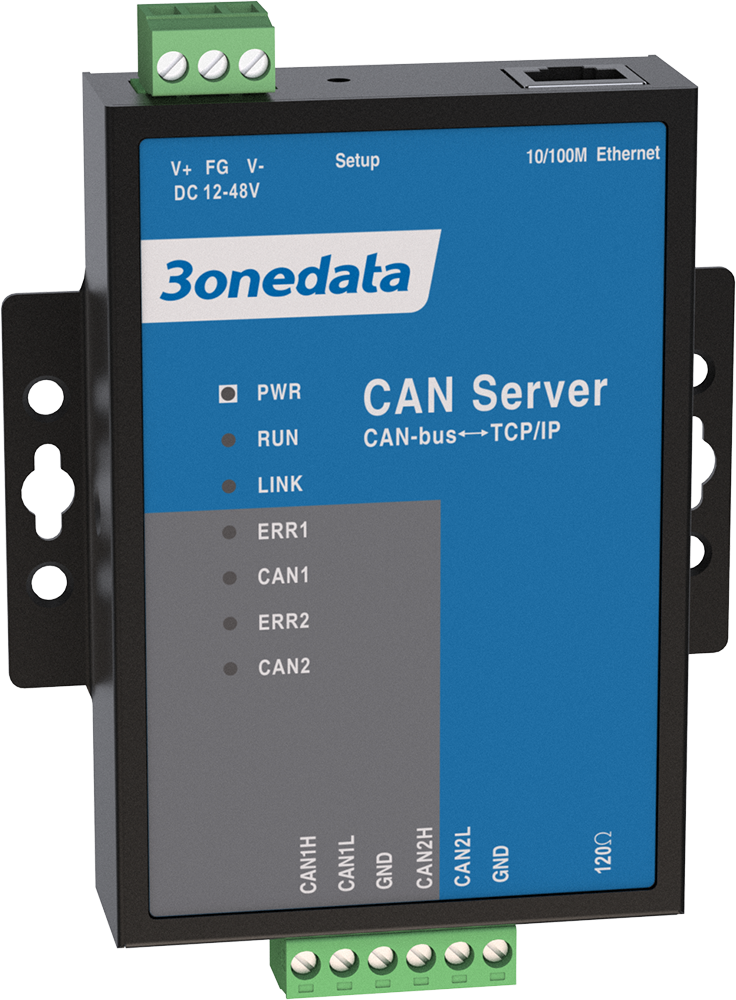

uSupport 2 CAN to 1 10/100Base-T(X) self-adaptive Ethernet interface
uSupport multiple operating modes like TCP Server, TCP Client, UDP Server, UDP Client, UDP Rang and UDP Multicast
uSupport 5K~1000Kbps arbitrary baud rate
uSupport -40~75℃ wide operating temperature range
GET A QUOTEIntroduction
CP202-2CI-P(12-48VDC) is a CAN server that has integrated 2 CAN ports and 1 Ethernet port. It can implement interconnection between CAN-Bus network and Ethernet to further extend the communication range of CAN-Bus network. This product supports 2 CAN to 1 100M Ethernet copper port and adopts wall mounting which can meet the requirements of different scenes.
Can server supports multiple network protocols, such as TCP, UDP, TELNET, ARP, ICMP, HTTP, DNS and DHCP protocol. It also possesses complete management functions, including Access Control, Rapid Configuration, Online Upgrading and so on. Each can port supports 4 TCP or UDP session connections, and it also supports TCP Server, TCP Client, UDP Server, UDP Client, UDP Rang, UDP Multicast operating modes and TELNET, WEB access modes. Network management system could bring you great user experience through its friendly interface design and easy and convenient operation.
Setup button can achieve the device restore factory defaults. DIP switch can add terminal resistance of CAN Port. Hardware adopts fanless, low power consumption, wide temperature and voltage design and has passed rigorous industrial standard tests, which can suit for the industrial scene environment with harsh requirements for EMC. It can be widely used in PLC control and management, Building Automation System, Health Care Automation System, measuring instrument and environmental forces monitoring system.
u Support 10/100Base-T(X) self-adaptive Ethernet interface
u Support 5kbps~1000kbps line-speed non-blocking communication
u Support multiple operating modes like TCP Server, TCP Client, UDP Server, UDP Client, UDP Rang and UDP Multicast
u Support cross-gateway and cross-router communication
u Support IP address and MAC address filtering, which can achieve accurate access control easily
u Support graded user management to implement humanized authority management
u Support CAN port status and parameter monitoring, making communication state clear to be seen
u Support automatic reconnection from network interrupts to establish reliable TCP connection
u Flexible CAN data framing setting can meet user’s various needs in data partition
u Support standard TCP/IP SOCKET application access
u TCP support multi-connection, which enables up to 4 users to monitor and manage CAN device simultaneously
u Stand-alone or multi-device communication is supported in UDP mode, which enables multiple users to monitor or manage CAN device simultaneously
u Support multiple configuration forms like Windows configuration tool, TELNET and WEB
| Ethernet | Standard: 10Base-T, 100Base-TX Protocol: TCP, UDP, ARP, HTTP, TELNET, ICMP, DHCP, DNS Rate: 10/100M Automatic Flow Control, MDI/MDI-X Autotunning Interface quantity: 1 Interface form: RJ45 Duplex mode: Full/Half Duplex Mode Self-adaption Operating mode: 4 sessions, support operating modes like TCP Server, TCP Client, UDP Server, UDP Client, UDP Rang and UDP Multicast |
| CAN Interface | Standard: CAN2.0A, CAN2.0B Interface quantity: 2 CAN ports CAN signal: CANH, CANL Duplex mode: 2-wire Half Duplex Mode Baud Rate:5/10/20/50/100/125/250/500/800/1000kbps Load capacity: support concurrent transmitting of 110 nodes Transmission distance: 40m~10km Interface form: adopt 6-pin 5.08mm pitch terminal blocks Terminating resistor: optional external 120Ω terminating resistor Interface protection: 2kVAC isolation protection |
| Configuration Method | WEB configuration management, TELNET configuration, Windows configuration tool |
| Security | Classification of User Permissions, IP Address Filtering, MAC Address Filtering |
| Indicator | Power supply indicator, network connection indicator, system running indicator, CAN status indicator, CAN error indicator |
| Power Supply | 12~48VDC, 3-pin 5.08mm pitch terminal blocks, support non-polarity |
| Power Consumption | No-load: 1.00W@12VDC Full-load: 1.10W@12VDC |
| Working Environment | Operating temperature: -40~75℃ Storage temperature:-40~85℃ Relative humidity: 5%~95%(no condensation) |
| Physical Characteristic | Housing: IP40 protection, metal Installation: wall mounting Dimension (W x H x D): 97mm×110mm×25mm Weight: 287g |
| Industrial Standard | IEC 61000-4-2 (ESD, electrostatic discharge), Level 3 l Air discharge:± 8kV l Contact discharge: ±6kV
IEC 61000-4-4 (EFT, electrical fast transient pulses), Level 3 l Power supply: ±2kV l Ethernet port: ±1kV l CAN port: ±2kV
IEC 61000-4-5 (Surge), Level 3 l Power supply: common mode±2kV, differential mode±1kV l Ethernet interface: ±2kV l CAN port: common mode±2kV, differential mode±1kV
Shock: IEC 60068-2-27 Free fall: IEC 60068-2-32 Vibration: IEC 60068-2-6 |
| Authentication | CE, FCC, RoHS certification |
| Warranty | 3 years |
| Available Models | 100M Copper Port | CAN | Power Supply |
| CP202-2CI-P(12-48VDC) | 1 | 2 | 12~48VDC |
